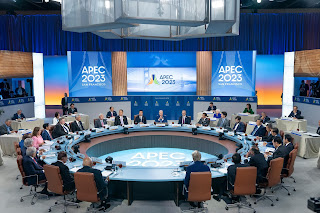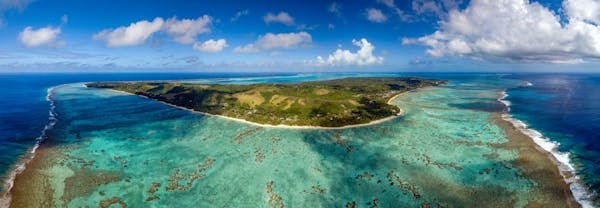The United Nations Intergovernmental Negotiationg Committee for a Global Plastics Treaty is meeting in Nairobi, Kenya from 13-19 November 2023. Global Plastics pollution is an escalating Crisis that interlinks with the Biodiversity Crisis and Climate Crisis. The process for a Global Plastics Treaty was started in March 2022 at the resumed fifth session of the UN Environment Assembly (UNEA-5.2).
A Zero Draft of the treaty has been prepared with elements of both common rules for all parties, and a nationally driven policy framework, and many procedural issues still to sort out.
UNEP third session INC3 website } CIEL preparatory work | Break Free From Plastic | IPEN
Australia is a member of the High Ambition Coalition to End Plastics Pollution
19 November - Day 7
INC3 concludes with no intersessional work approved, petro states blocking consensus, negotiating in what some call in bad faith. New revised zero draft authorised to be prepared by the Secretariat by 31 December 2023 for INC4 in Ottawa in April 2024
 |
Plenary suspended and delegates
continued deliberations in informal groups.
Photo: by IISD/ENB | Anastasia Rodopoulou |
Read IISD/ENB
report on Sunday negotiations
Magnus Løvold (@magnuslovold) from Norwegian Academy of International Law, tweeted:
The third round of the #PlasticsTreaty #INC3 negotiations just concluded in Nairobi with no plan for how to move the process forward. This is a deeply disappointing, but not unexpected, outcome. For too long, ambitious countries have failed to face up to the reality that a meaningful treaty on plastic pollution cannot be achieved as long as the least ambitious countries are allowed to control the pace of the process.
The Nairobi round will go down in history as an unqualified failure of multilateral environmental diplomacy. It did nothing but record in elaborate detail the magnitude of the committee’s disunity. The week’s proceedings have swept away all doubt that some of the countries involved in this process — notably Iran Saudi Arabia and Russia — are negotiating in bad faith. It is impossible to develop a treaty on plastic pollution under such circumstances.
As they prepare for the next negotiation round in Ottawa, @HACplastic and other ambitious countries must muster the courage to move ahead, even if those least willing to join stay behind.
We cannot afford to let a small minority of countries continue to hold this process hostage. It is time to overrule their spoiler tactics, and take future substantive decisions to a vote #ConsensusKillsDemocracy
Centre for International Environmental Law: Ambition Meets Inertia in Third Session of Global Plastic Treaty Talks. Argues that Absent a Major Course Correction, Ottawa will host a “Polite but Massive Failure.”
“This week made clear that an overwhelming majority of countries demand an ambitious treaty that covers the full lifecycle of plastics,” said CIEL President Carroll Muffett. “That treaty is still achievable in these talks, but only if negotiators acknowledge and confront the coordinated campaign by fossil fuel and petrochemical exporters to prevent real progress of any kind.”
Alongside exporting countries themselves, INC-3 saw a massive presence in the industries that make plastics and plastic feedstocks. A CIEL analysis revealed that 143 fossil fuel and chemical industry lobbyists registered for the negotiations – including on country delegations.
“The results this week are no accident,” said David Azoulay, Program Director for Environmental Health at CIEL. “Progress on plastics will be impossible if Member States do not confront and address the fundamental reality of industry influence in this process.”
There was also criticism of the High Ambition Coalition in the CIEL statement. Australia is a member of the High Ambition Coalition.
a troubling number of wealthier countries, including members of the 60+ member “High Ambition Coalition to End Plastic Pollution,” suggested a willingness to prioritize short-term consensus over long-term success.
“‘High Ambition’ is not a brand — it’s a commitment,” Azoulay said. “High Ambition countries in the Global North must follow the lead of Rwanda, Uruguay, and Pacific Island states in fighting to ensure ambition is reflected not just in empty political commitments but in the final treaty text.”
Break Free From Plastic (@brkfreeplastic) tweeted:
The #INC3 missed a vital chance for ambitious action on plastic reduction. A few loud voices held sway, blocking advances in setting targets, baselines & schedules.
We need a strong #ConflictofInterest policy to overcome deliberate obstruction.
In a statement they called for a strong conflict of interest policy and reassess how to deal with the countries deliberately blocking the ambition of the negotiation process.
Despite a mandate for a revised draft, Member States failed to reach an agreement on priorities for intersessional work ahead of INC-4, despite an 11th-hour attempt, jeopardizing significant advancements for the treaty process.
With the petrochemical influence in the treaty negotiations, including the ‘low ambition’ of a group of ‘like-minded’ plastic-producing countries, and the lack of ambition by the so-called ‘high ambition’ countries, the INC-3 concluded without concrete headway towards the mandate adopted at the fifth United Nations Environment Assembly (UNEA 5.2) to negotiate a comprehensive and legally binding treaty that will cover measures along the entire life cycle of plastic.
Greenpeace Canada responded: UN INC3 ends in frustration as governments allow low ambition countries to derail Global Plastics Treaty
“This round of Global Plastics Treaty talks proves once again the toxic influence the petrochemical industry has on global governments and our future. Between now and the next round of negotiations, high ambition countries have their work cut out for them to counter the damage done by the problematic low ambition countries. Unless the Treaty dramatically reduces plastic production, we cannot make gains on the worsening climate, pollution and biodiversity crises and their associated harms to people worldwide.
“The Global Plastics Treaty must reduce plastic production by at least 75% by 2040 to stay within the 1.5 degree threshold."
GAIA statement - Plastics Treaty Negotiations held Hostage by small handful of Oil Producing Countries - excerpt:
At the start of INC-3 the Zero Draft was a balanced document representing a range of views to provide Member States a basis for negotiating; by Sunday afternoon the draft more than tripled in size. A minority of Member States–particularly oil-producing nations in the newly formed informal “group of like-minded countries” including Iran, the Russian Federation, and Saudi Arabia– undermined the previously agreed upon mandate for a plastics treaty, seeking to include low-ambition language and trying to run out the clock.
Such interventions include inserting language on “national priorities,” “national circumstances,” and a “bottom-up approach,” which could lead to voluntary measures overpowering legally-binding measures – a thus far failed approach to international environmental policy, as evidenced by the Paris Climate Agreement.
The same Member States, and some others, worked hard to undermine the mandate for a treaty covering the “full lifecycle of plastic, including its production, design, and disposal” (Res. 5/14), to focus solely on waste management approaches, claiming that the problem is not plastic itself, but its disposal.
“There is no difference between plastic and plastic pollution– plastic is pollution,” says Rafael Eudes, Aliança Reziduo Cero, Brazil. Plastic pollutes from the moment fossil fuels are extracted from the earth, to when the waste is thrown away.”


































